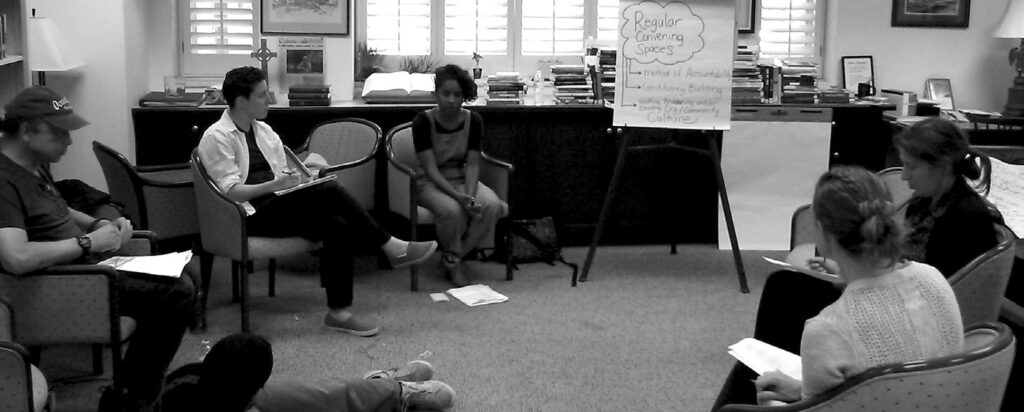Organizers from across the city came together in May for the third annual Service to Justice conference. These events are designed to confront some of the difficult questions facing service providers, advocates, and organizers working for justice in Washington, D.C., according to the event’s website. “Even as ‘do-gooders,’ [we] can and often do perpetuate structural racism and systemic poverty,” the description continued.
This year the People for Fairness Coalition held a plenary to share some of their current work and build partnerships with other organizations and community groups in attendance.
PFFC Director Robert Warren gave an overview of PFFC’s universal right to housing campaign. “We were a rag team when we started to advocate. There were around nine of us and we were all homeless at the time,” Warren said.
He attributed the campaign’s inception to the observation that many longtime residents of the District of Columbia were being overlooked. He said many organizations have since come to agree that housing is a universal right and PFFC is trying to organize everyone around unified policy requests.
“Of all the units that are produced, one third of rental units in the city [should] be designated as universal units,” Warren said. He also cited reports from a 2013 city task force that examined the shelter at 2nd and D Streets NW and its future. “Fifty percent of that shelter are on fixed incomes,” Warren said. “What we are saying is that fifty percent of people who have been on the waiting list should automatically qualify for housing assistance.”
Warren used the housing waiting list discussion to transition to talking about PFFC’s annual vigil and march to remember people that have died while homeless in D.C. He said many of the people recognized at the vigil had found housing just months before they died. Seventeen people in D.C. died before they could use their housing voucher in 2016.
Warren used his new neighbor as an example. “This is a guy who has had two heart attacks and is clearly disabled — and was on the housing wait-list for 13 years,” he said. “Be your own advocate. You have to be the one that speaks for yourself.”
Next, Janet Sharp presented PFFC’s public restroom initiative. “If housing is a human right, then public restrooms are also a human right,” she said. Safe public restrooms are available in many countries in Europe and Asia, according to Sharp. She contrasted this with the potential fines and jail time for public urination and defecation.
PFFC has been researching the feasibility of public restrooms downtown for several years. Recently, Ward 1 Councilmember Brianne Nadeau took interest in their work and introduced legislation to create a city taskforce to further explore the option. “It’s a sign of social responsibility,” Sharp said. “We need all the allies we can get right now. We have a petition online and have testified at city council. Don’t be afraid — if I can do it anybody can.“
Sharp said that PFFC has gained support for solving this public health issue from three business improvement districts, three advisory neighborhood commissions, two churches, seven nonprofits and six councilmembers. She welcomed any other allies to reach out or attend the next weekly PFFC meeting.
The presentation was concluded with an overview from founding member Albert Townsend on pushing the Michael A Stoops Anti-Discrimination Act forward. “Michael Stoops was the catalyst behind asking us about anti-discrimination legislation.” he said. “It covers areas to include public space and housing. It’s really bridging the gap between legislation and the people.”
Towsend noted that groups PFFC usually doesn’t connect with have signed on to support this bill. He said that it is good to have so many voices involved, including the business community, but that the people experiencing this discrimination need to really press the issue. “We have to build a movement for this legislation to be passed,” Towsend said. ■
Service To Justice Conference Provides a Seat at the Table

PHOTO BY REGINALD BLACK
Issues |Civil Rights|Housing|Political commentary
Region |Washington DC
email updates
We believe ending homelessness begins with listening to the stories of those who have experienced it.
Subscribe





